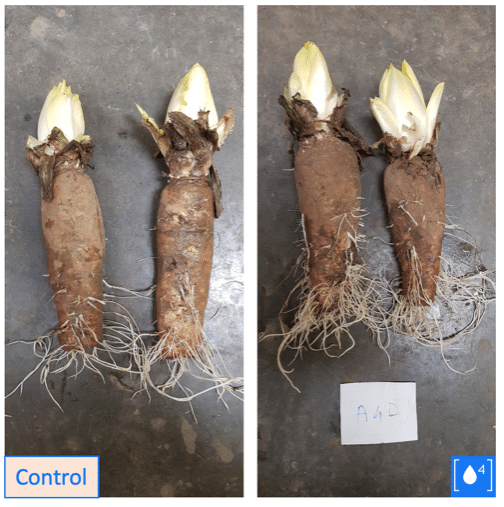As the costs of agricultural production rise around the world, interest is increasingly turning to high-value crops and to methods which save resources. A grower in northern France combines both these aspects – upscaling their growth of high-value chicory crops while implementing agtech to maximize growth potentials. In doing so, they will see their cleantech investment paid off in a short time.
The grower in Pas-de-Calais grows chicory hydroponically and was looking for a way to increase productivity and growing speed. They cultivate in exterior fields, before bringing them inside into soilless conditions. After trialing AQUA4D® technology in collaboration with Eqomodul, they wanted to put it to the test before deciding to equip their whole facility. A hydroponic lettuce grower in Brazil previously saw +25% increases in plant weight and overall yields – could such results be replicated here?
How it works
Those familiar with AQUA4D® technology will be aware of its impact in keeping soils moist for longer, thus entailing less irrigation. Less known but equally important are the impacts of treatment technology on minerals and nutrients contained in water. The nutrients within are efficiently dissolved, making them more available and hence absorption by the plant is easier and more efficient. In hydroponic and soilless growing, this aspect most clearly explains the benefits witnessed by growers.
Tracking progress: Technology-as-a-Service
To ensure a fair trial, the side-by-side experiment was conducted in the same room with the same temperatures and the only variable being AQUA4D® irrigation vs normal irrigation.
To track progress, measurements were taken including EC levels, room temperature, and water temperature.
Result: Increased fine rootlets
Given the boosted nutrient uptake, and on the basis of previous results, increased growth of finer rootlets is expected with AQUA4D® water treatment. This is precisely what was observed here in France. As can be observed in the adjacent photo there are clearly more fine roots, which helps explain improved growth and ultimately higher yields as the plants can more efficiently absorb the available nutrients.
Result: Increased yields
The mechanization of processes here, including weighing prior to packing, enabled very clear data regarding weight and productivity.
The results clearly imply that the increased nutrient availability had a direct impact on the subsequent yields, with crop weight steadily increasing from September to January. Average increases were +13.5%, pointing to an instant and impressive impact of AQUA4D® irrigation, with the highest comparable increase reaching +31.5%. The results are clearly seen in the graph below:
Note: Sept & Nov compared 1x batch, Dec & Jan compared 3x and 4x batches respectively, with 9 production batches compared in total.
Result: Rapid ROI
Not only were impressive yields observed, but significant impacts were seen in Category 1 production – the most valuable crops. Judging by this, the gains per cycle equate to an estimated ROI in just 18 months, even in a situation with low market prices.
Bernard Bourde from Eqomodul oversaw the project with AQUA4D’s technical team. “At a time when profits are being squeezed in agriculture, an average yield increase of 13.5% in such a short time implies something special has happened thanks to AQUA4D irrigation,” comments Bourde. “Over time, this would point to a quick Return on Investment which if replicated elsewhere could provide significant economic boosts to agricultural production in France.”
—–
Find out how AQUA4D® increases nutrient uptake:
France
Water-Smart Agriculture
Precision Irrigation
“At a time when profits are being squeezed in agriculture, an average yield increase of 13.5% in such a short time implies something special has happened thanks to AQUA4D irrigation. Over time, this would point to a quick Return on Investment which if replicated elsewhere could provide significant economic boosts to agricultural production in France.”
– Bernard Bourde, Eqomodul
AQUA4D’s Yvain Mirabal conducts pre-installation checks
Significant impacts were seen in Category 1 production – the most valuable crops.






